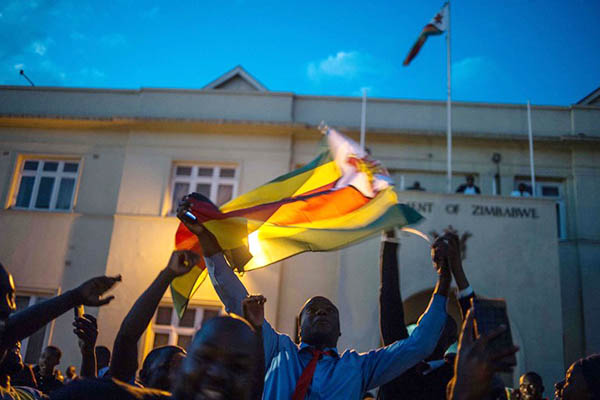
Mujahid Safodien—AFP
Zimbabwean president steps down after 37 years in power
Car horns blared and cheering crowds waving the national flag thronged the streets of Zimbabwe’s capital Harare on Tuesday after news broke that President Robert Mugabe had resigned after 37 years in power.
The announcement came after days of mounting pressure on the 93-year-old leader, whose long and authoritarian rule made him feared by many of his citizens. “We are just so happy that things are finally going to change,” Togo Ndhlalambi, 32, a hairdresser, told AFP. “We woke up every morning waiting for this day. This country has been through tough times.”
After a week of political turmoil, Zimbabweans reacted with shock, disbelief and delight. “I am so happy that Mugabe is gone, 37 years under a dictatorship is not a joke,” said Tinashe Chakanetsa, 18. “I am hoping for a new Zimbabwe ruled by the people and not by one person. We need leaders who are selected by the people and not rulers. I am looking forward to get a job after our economy recovers.”
Massive crowds gathered within minutes of the surprise announcement made to a meeting of parliamentary lawmakers who were discussing a motion to impeach Mugabe.
At the Rainbow Towers conference center where the M.P.s were gathered, a framed portrait of the president was ripped from the wall, torn apart and stamped to pieces by a cheering crowd. “It’s shocking, that guy [was] powerful, very powerful,” said Barber Wright Chirombe, one of those who joined the euphoric street celebrations.
Across the city, men danced, women sang and many were in tears, brandishing national flags and often praising General Constantino Chiwenga—the man who led the army takeover that finally triggered the crisis that overthrew the ageing president. “We were reduced to worthless people under Mugabe,” said Yeukai Magwari, 33, a vendor dancing with uniformed domestic maids in the Avondale neighborhood of the capital. “From now on we don’t want to see our elderly men and women sleeping in queues outside banks, and people reduced to being destitute after going to college,” he said.
Tendai Chaitezvi, 29, a bank employee, celebrated with friends at the Fiesta bar in the Avenues district as music was blasted from several car stereos. “The situation in the country under this man was rough,” he said. “A lot of our friends went abroad in search of jobs and were wondering how we managed to survive back here. There is suddenly a sense of optimism now. Today is the start of hoping that things will get back to normal.”
Leah Macharaga, 37, was born in 1980, the same year that Mugabe came to power. “I hated that man,” she said simply.
The news came shortly before dusk in Harare, and as dark fell cars careened through the unlit streets. “I am happy beyond words. Now we expect a better future for our country than the hardship we endured under Mugabe,” Modesta Macharaga, 35, told AFP.
Some locals immediately focused on the country’s uncertain future, and likely next president Emmerson Mnangagwa, a former Mugabe ally with a reputation as a ZANU-PF party hardliner responsible for violent crackdowns on dissent.
“Mugabe’s resignation must be followed by the resignation of all those have surrounded him,” Munyaradzi Chihota, 40, a businessman in Harare, told AFP. “We need a complete overhaul, not just the removal of one person at the top. With any elements of ZANU PF still in power I doubt that we will move forward.”
“We hate ZANU-PF and we don’t want to replace a dictator with another dictator,” said Oscar Muponda, an office worker in the capital.
In Zimbabwe’s second city of Bulawayo, Mandla Mpofu, 63, a lawyer gathered with friends at the Continental Bar. “It has been years and years of suffering and here is freedom at last. I am going to celebrate late tonight.”
